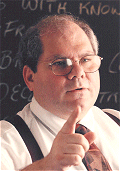 |
QW2002 Paper 3Q Cem Kaner A short course in metrics & measurement dysfunction |
|
Relatively few software publishers (or in-house IT groups) have metrics programs in place. Many have tried, few have succeeded. I don't think that the widespread failure of metrics programs in the field is due to a lack of professionalism, laziness, lack of interest in quality or lack of sophistication of the staff. Rather, I think the failures stem from mistrust of the measurements and the people who take them, lack of respect for the models that relate the measurements taken to the constructs they supposedly measure, and examples of manipulation or misues of the data collected. These are serious problems. We should take them seriously.
Cem Kaner is Professor of Computer Sciences at the Florida Institute of Technology. Prior to joining Florida Tech, Kaner worked in Silicon Valley for 17 years, doing and managing programming, user interface design, testing, and user documentation. He is the senior author (with Jack Falk and Hung Quoc Nguyen) of TESTING COMPUTER SOFTWARE (2nd Edition) and (with David Pels) of BAD SOFTWARE: WHAT TO DO WHEN SOFTWARE FAILS.Through his consulting firm, KANER.COM, he teaches courses on black box software testing and consults to software publishers on software testing, documentation, and development management. Kaner is also the co-founder and co-host of the Los Altos Workshop on Software Testing, the Software Test Managers' RoundTable, the Workshop on Heuristic & Exploratory Techniques, and the Florida Workshops on Model-Based Testing.
Kaner is also attorney whose practice is focused on the law of software quality. He is active (as an advocate for customers, authors, and small development shops) in several legislative drafting efforts involving software licensing, software quality regulation, and electronic commerce. Kaner holds a B.A. in Arts & Sciences (Math, Philosophy), a Ph.D. in Experimental Psychology (Human Perception & Performance: Psychophysics), and a J.D. (law degree). He is Certified in Quality Engineering by the American Society for Quality.